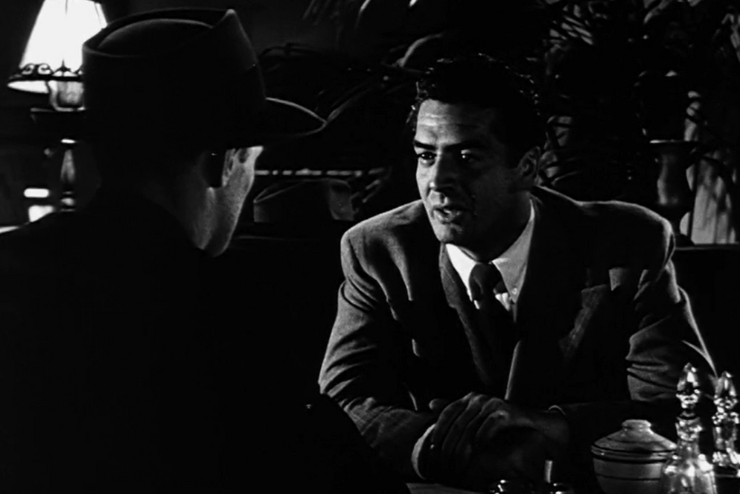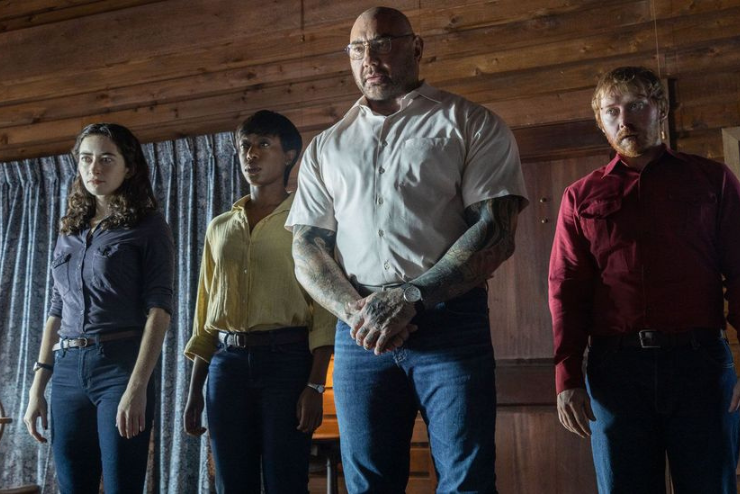Knock at the Cabin
Written, produced, and directed by M. Night Shyamalan ◆ Distributed by Apple Original Films ◆ Based on The Cabin at the End of the World, by Paul G. Tremblay
Kiss of Death
Directed by Henry Hathaway ◆ Screenplay by Ben Hecht and Charles Lederer from a book by Eleazar Lipsky ◆ Produced by Fred Kohlmar
Knock at the Cabin is an M. Night Shyamalan film adapted from a novel, The Cabin at the End of the World, by Paul G. Tremblay. I’ve read a bit of this novel. But I doubt I will finish it. The little I have read reveals it to be a ridiculous end-of-the-world exercise. Why Shyamalan adapted it is as mysterious as many of the other choices in his odd movie-making career. He began with three winning films, The Sixth Sense, Signs, and Unbreakable. Each was also odd but somehow rose above its premises by means of talented actors, some clever directorial strategies, and, of course, Shyamalan’s signature preference for trick endings.
The Cabin is another story, however. The premise here is that two homosexuals married to each other, Eric and Albert, have repaired to their rustic lake-side vacation cabin in a wooded expanse in deepest Vermont. And for additional intrigue, they’ve taken with them their adopted daughter, Wen, an eight-year-old Korean girl. Once the trio is at the rustic cabin, things begin to go seriously wrong.
In the first scene, we see Wen collecting grasshoppers in a glass jar, but not very carefully. Then, out of the woods marches a monster named Leonard, played by Dave Bautista, my favorite wrestler-turned-actor. Leonard immediately joins Wen in her grasshopper hunt, warning her that the insects will die if they don’t punch holes in the jar’s metal lid. Understandably, Wen is apprehensive at first, but Leonard’s voice is so kind and his movements so gentle that she soon overcomes her fear. Yet she feels she must warn her fathers that this giant is in their backyard.
Despite his kindliness, Leonard has come to fulfill a troubling mission. He informs Wen and her daddies that he’s arrived at the direction of a supernatural force that has commanded him and his associates to prevent an apocalypse headed their way. But not to worry. The disaster can be thwarted, and to do so, Leonard explains, is relatively simple. It only requires that one of the cabin’s occupants kill him- or herself. Yes, chillingly, Wen is up for grabs with her dads, a turn of events that Wen does not seem to grasp at first.
Her daddies do, though, and they’re not having any of this voodoo-hoodoo cult superstition. They’re reasonably convinced that Leonard and his associates are crazy. And furthermore, neither of the fathers cares to execute himself. When they balk at the order, Leonard and his associates leave mystified. How can these good people not see the necessity of making the sacrifice?
So with the premise in place, the story moves into an extended period of inaction. Both Eric and Andrew are stymied. Of course, they don’t believe Leonard. Who would? But neither do they have any ready means of resistance to Leonard and his associates. Not until Albert remembers he has a gun in his pick-up truck and manages to get it. Nevertheless, they are still not willing to take action. Instead, they continue to listen to Leonard’s calm, reasonable voice as he points out that time is essential. They’ve got to do the reasonable thing before the hour is up.
What to do? The tension mounts quietly as we get a flashback to Eric and Andrew facing their hostile parents who despise their mode of life. They also recall being roughed up by homophobes in a bar. These are experiences that have had much to do with their buying the cabin and using it as their retreat from the hatred they encounter in the heterosexual world.
I have to confess that, at this point, I felt confused. What was Shyamalan’s point?
And whatever it was, I wondered if he was going to lead us into his patented surprise ending. Well, the answer was yes, of course. The twist in this film is even more outlandish than the preceding events. By outlandish, I mean stupid and stupefying. If you see the film, feel free to laugh at it if you’re so disposed. I certainly did. And I wondered once more how Shyamalan raises the money to make such daffy films.
And here’s an additional mystery: why, in both the film and the novel, were they homosexuals? How did this advance the plot and/or develop the theme in any way?
Although it wouldn’t be sporting, I’m tempted to reveal the ending, but I won’t. On the other hand, I can’t recommend the film unless you’re a staunch Shyamalan fan, something I once was but no longer am. I don’t like tripe, and this is what he’s been serving in his recent films.
The movie’s only saving grace is Bautista’s performance. The more I see of this mountainous Greek-Filipino wrestler, the more I’m convinced of his talent. For a man who looks like a mid-sized truck as he caroms around plot corners, he’s able to convince you that, despite his impressive musculature, his characters are, more often than not, decent, compassionate men.
I don’t know if Shyamalan’s film can be classified as science fiction, but it somehow reminded me of a sci-fi film released in 1953, Invaders from Mars—not what anyone would call a good example of the genre, but it remains in my memory largely because it gave me my earliest opportunity at suspension of disbelief. The film concerns a young boy who’s awakened from sleep by the landing of a flying saucer. Upon the saucer’s opening, Martians emerge and proceed to somehow insert what looks like metallic cloves into the back of adults’ necks, reducing them to soulless agents of the Martians’ wishes, something akin to what happens in the much better film, Invasion of the Bodysnatchers. (Americans in the early 1950s were especially prone to this theme. Think communism.) But back to the point. As the film reached its climax, dozens of menacing Martians outfitted from head to toe in fuzzy green onesies began running away from American soldiers. Seen from behind, the onesies had very visible zippers running down their spines.
As my friends and I left the theater, several were laughing. I took exception to this mockery and pointed out that it might be normal for Martians to have zippers running down their spines. Of course, I had never heard the phrase “suspension of disbelief.” It seems to me now that my willingness to exercise this suspension was an early portent that I was fated, God save me, to major in English when I reached college and then to become, doubly portentous, an English professor. Well, what the heck, there are worse pursuits.

Along with my new-film-watching this month, I looked back to another favorite of mine, one I hadn’t seen in quite a while: Kiss of Death, which also demands some suspension of disbelief. It stars the invaluable Victor Mature playing a career criminal who, with the help of a patient, friendly assistant district attorney played by the dispensable Brian Donlevy, gets his second chance. That film came out in 1947, a few years before Mature began wrestling tigers in the Colosseum in films such as Demetrius and the Gladiators and a few years before Donlevy made the mistake of descending into low-budget science-fiction films.
Kiss of Death is memorable for several reasons. One is that it was filmed on location in Astoria, New York, a modest, unpretentious neighborhood that was and largely still is home to various immigrant groups: Greek, Italian, Lebanese. It was, I think, the first film I saw that featured real houses, fronted by cheap metal anchor fences, which clearly served as a metaphor for the social ambience of the Astoria neighborhood. The fences were calculated to help the audience suspend their disbelief and accept the reality of a neighborhood populated by lower-middle-class folk. In short, it was the kind of neighborhood with which I was quite familiar. The film was adapted from a book by Manhattan Assistant District Attorney Eleazar Lipsky, who obviously wrote himself into Donlevy’s character.
Kiss of Death was also Richard Widmark’s first film. He gained distinction playing a psychotic gangster who avenges himself on a stoolie by pushing the latter’s wheelchair-bound mother down a flight of stairs to her death, giggling maniacally all the while he’s doing it.
The film also features the beautiful Colleen Gray, playing Mature’s sweet, loyal girlfriend.
For sleaze blended with bravery and romance, you can’t do much better than this film.

Leave a Reply